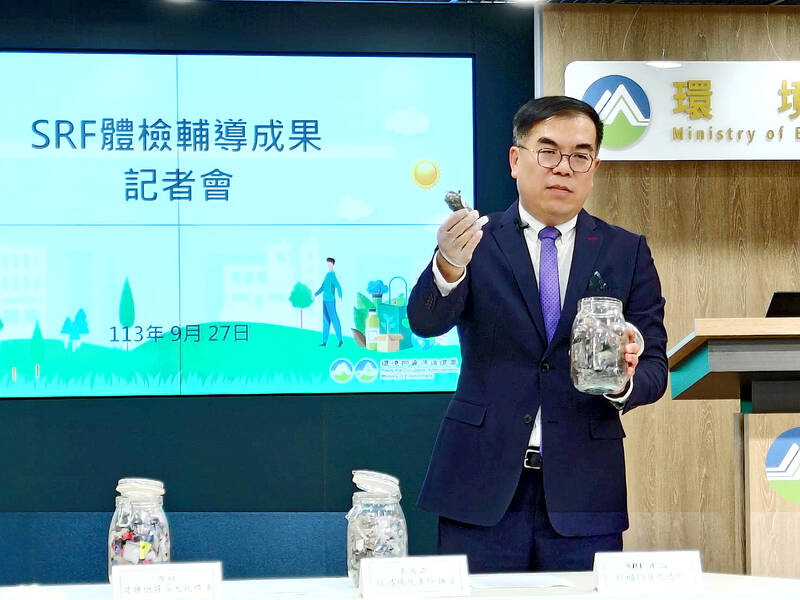Taiwan has tightened air quality regulations governing the production and use of alternative fuels to align with international standards, the Ministry of Environment said in a statement yesterday.
Stronger safeguards are needed for the nation to utilize solid recovered fuels, biofuels and waste-derived fuels to achieve net zero carbon emissions by 2050 without adding to air pollution, the ministry said.
The new rules provide a uniform set of fuel composition standards for fuel manufacturers, speicify appropriate fuel types for various applications and air pollution control mechanisms that must be used, it said.

Photo: Wu Po-hsuan, Taipei Times
Some manufacturers and end-users would be required to upgrade their equipment to retain their license, the ministry said.
The legal standards for heavy metal and dioxin emissions and combustion efficiency of boilers have been increased to conform with those established by the EU and other advanced nations, it said.
In addition, end-users must install sensors that have been linked to an appropriate regulator to continuously monitor dioxin standards and be held responsible for regular chimney inspections, the ministry said.
The revisions to the legal guidelines are intended to empower regulators end-to-end oversight of the industry’s supply chain with built-in redundancy of methods to ensure compliance, it said.
Separately, the Taiwan Science Media Center on Thursday called on the ministry to clarify its carbon emission reduction target over the coming years and raise carbon prices to a standard comparable to the best international practice.
Most Taiwanese experts agree that the government’s 2030 target to cut emissions by 26 to 30 percent compared with 2005 was too vague, said Hsu Hsin-wei (徐昕煒), associate professor of industrial engineering and management at National Taipei University of Technology.
Establishing a goal with excessive margins for error introduces uncertainty that a definitive target would not, he said, citing the center’s survey.
Taiwanese experts additionally agree that the carbon prices stipulated by the current system are too cheap to support even the ministry’s relatively unambitious 2030 goal, Hsu said, adding that the global target is slashing emissions by 42 percent.
The same poll suggests the nation’s architects believe their profession should promote designs that regulate heat without using air-conditioning, materials that require less carbon emissions to manufacture, and boast longer service life to avoid wastage, said Tsay Yaw-shyan (蔡耀賢), professor of architecture at National Chung Kung University (NCKU).
Cheng Tsu-jui (鄭祖睿), an assistant professor in NCKU’s Department of Transportation and Communication Management Science, said improvements in public transportation utilization rates are not catching up with the ever-increasing use of cars and motorbikes.
The government should begin considering measures that directly regulate the use of privately owned vehicles, including cars and trucks being utilized for commercial logistics, he said.

Chinese spouse and influencer Guan Guan’s (關關) residency permit has been revoked for repeatedly posting pro-China videos that threaten national security, the National Immigration Agency confirmed today. Guan Guan has said many controversial statements in her videos posted to Douyin (抖音), including “the red flag will soon be painted all over Taiwan” and “Taiwan is an inseparable part of China,” and expressing hope for expedited reunification. The agency last year received multiple reports alleging that Guan Guan had advocated for armed reunification. After verifying the reports, the agency last month issued a notice requiring her to appear and explain her actions. Guan

GIVE AND TAKE: Blood demand continues to rise each year, while fewer young donors are available due to the nation’s falling birthrate, a doctor said Blood donors can redeem points earned from donations to obtain limited edition Formosan black bear travel mugs, the Kaohsiung Blood Center said yesterday, as it announced a goal of stocking 20,000 units of blood prior to the Lunar New Year. The last month of the lunar year is National Blood Donation Month, when local centers seek to stockpile blood for use during the Lunar New Year holiday. The blood demand in southern Taiwan — including Tainan and Kaohsiung, as well as Chiayi, Pingtung, Penghu and Taitung counties — is about 2,000 units per day, the center said. The donation campaign aims to boost

The Kaohsiung Tourism Bureau audited six hotels in an effort to prevent price gouging ahead of Korean band BTS’ concert tour in the city scheduled for Nov. 19, 21 and 22 this year. The bureau on Friday said that the audits — conducted in response to allegations of unfair pricing posted on social media — found no wrongdoing. These establishments included the local branches of Chateau de Chine, Hotel Nikko, My Humble House, and Grand Hai Lai, it said, adding that the Consumer Protection Commission would have penalized price gougers had the accusations been substantiated. The bureau said the Tourism Development Act

The Central Weather Administration (CWA) said a magnitude 4.9 earthquake that struck off the coast of eastern Taiwan yesterday was an independent event and part of a stress-adjustment process. The earthquake occurred at 4:47pm, with its epicenter at sea about 45.4km south of Yilan County Hall at a depth of 5.9km, the CWA said. The quake's intensity, which gauges the actual effects of a temblor, was highest in several townships in Yilan and neighboring Hualien County, where it measured 4 on Taiwan's seven-tier intensity scale, the CWA said. Lin Po-yu (林柏佑), a division chief at the CWA's Seismological Center, told a news conference